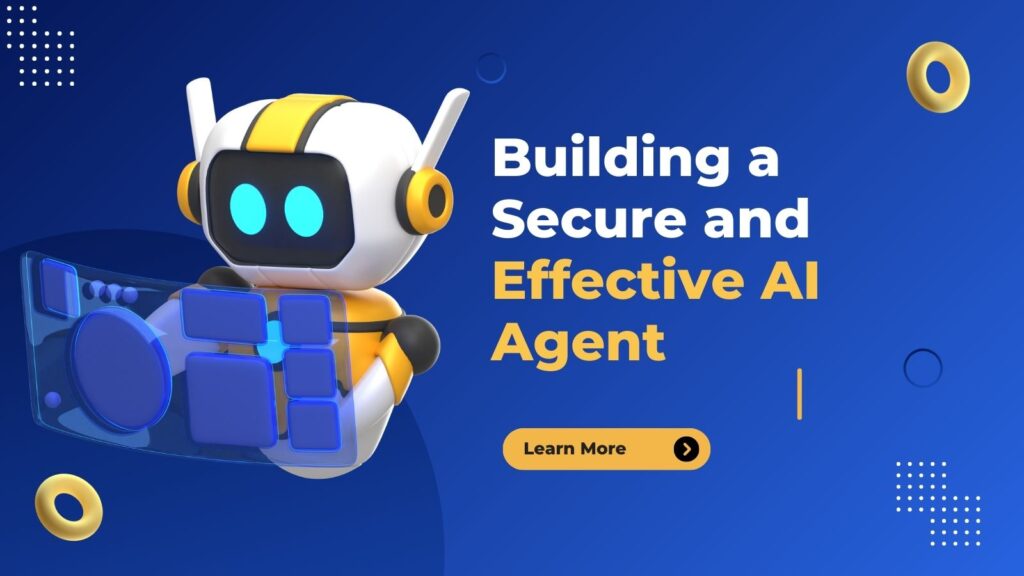How to Create a Transportation App: Features,
Price, and Implementation Steps
29 Aug 2023
18 min

CTO

Technical Writer
For businesses to stay competitive, they need to constantly seek innovative solutions that allow them to streamline operations and enhance customer experiences. One of the most transformative technologies driving this change is Artificial Intelligence (AI). Among the many advancements in AI, AI agents have emerged as a powerful tool with the potential to revolutionize how businesses operate. But what is an AI agent, and why does your business need it?
This comprehensive guide dives deep into the world of AI agents, exploring their definition, functionality, types, benefits, and real-world applications. By the end, you’ll understand why integrating AI agents into your business strategy is not just a luxury but a necessity for staying ahead in the modern market.
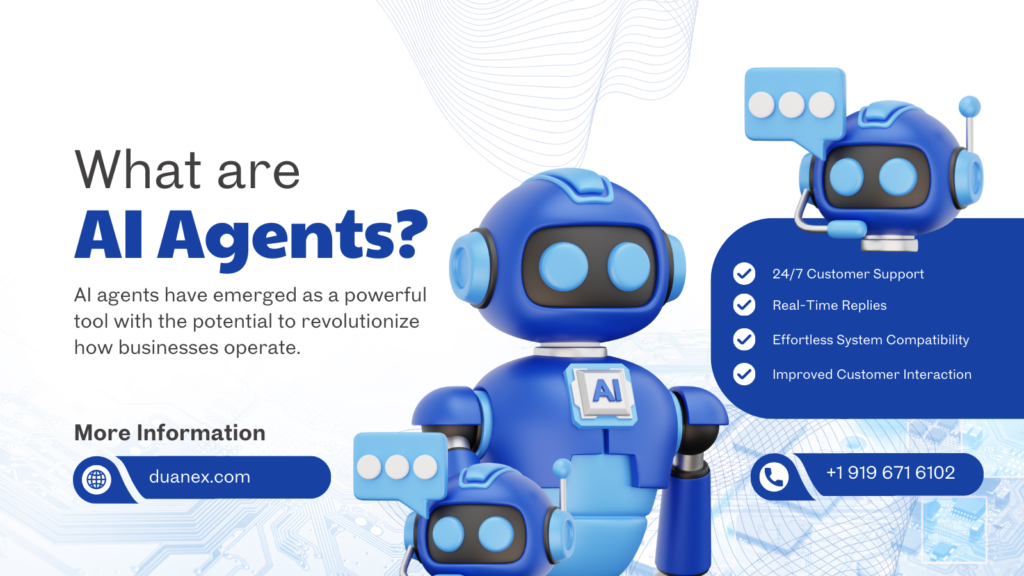
What is an AI Agent?
AI agents are autonomous software systems powered by artificial intelligence that can perform tasks, make decisions, and interact with users or other systems with minimal human intervention. Unlike traditional software programs that follow predefined rules, AI agents leverage advanced technologies such as machine learning (ML), natural language processing (NLP), and computer vision to adapt, learn, and respond to dynamic environments.
At their core, AI agents are designed to mimic human-like intelligence, enabling them to understand complex inputs, process data, and execute actions that align with specific goals. For example, an AI agent could be a chatbot assisting customers on a website, a virtual assistant scheduling meetings, or a sophisticated system optimizing supply chain logistics.
Key Characteristics of AI Agents
AI agents possess several defining characteristics that set them apart from conventional software:
- Autonomy: AI agents can operate independently, making decisions without constant human oversight.
- Adaptability: They learn from data and experiences, improving their performance over time.
- Interactivity: AI agents can communicate with users, other agents, or systems in real-time.
- Goal-Oriented Behavior: They are designed to achieve specific objectives, such as solving problems or completing tasks.
- Context Awareness: AI agents understand and respond to the context of their environment, making them highly versatile.
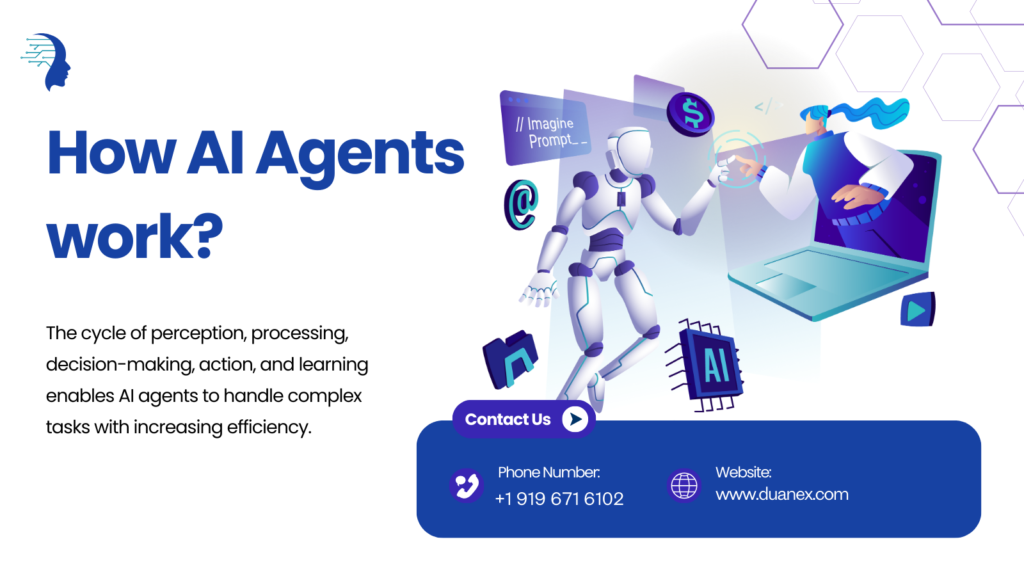
How AI Agents work?
AI agents function by combining several AI technologies into a cohesive system. The typical workflow of an AI agent includes:- Perception: The agent collects data from its environment, such as user inputs, sensor data, or external APIs.
- Processing: Using algorithms and models (e.g., neural networks), the agent analyzes the data to understand patterns or make predictions.
- Decision-Making: The agent evaluates possible actions based on its goals and selects the optimal course of action.
- Action: The agent executes the chosen action, which could involve generating a response, performing a task, or updating a system.
- Learning: The agent uses feedback from its actions to refine its performance, becoming more effective over time.
This cycle of perception, processing, decision-making, action, and learning enables AI agents to handle complex tasks with increasing efficiency.
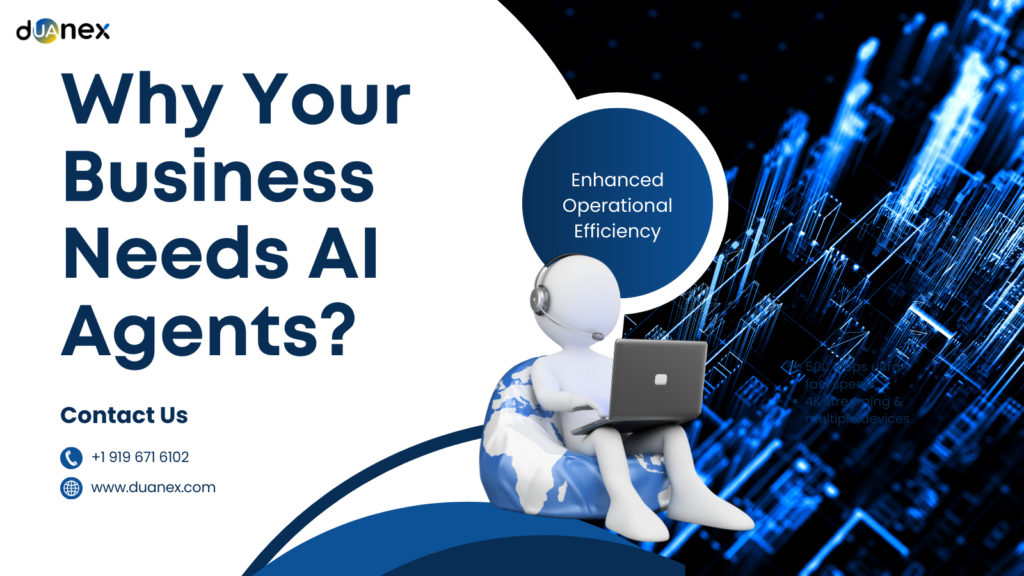
Why Your Business Needs AI Agents
The adoption of AI agents is no longer a futuristic concept—it’s a strategic imperative for businesses across industries. Here’s why your business needs AI agents to thrive in the modern economy:
1. Enhanced Operational Efficiency
AI agents automate repetitive and time-consuming tasks, allowing businesses to operate more efficiently. By handling tasks such as data entry, customer inquiries, or inventory management, AI agents free up human employees to focus on high-value activities like strategy and innovation.
- Example: An AI agent in a warehouse can monitor stock levels, reorder supplies, and optimize storage, reducing manual labor and errors.
- Impact: Businesses can reduce operational costs by up to 30%, according to McKinsey & Company.
2. Improved Customer Experiences
Today’s customers expect personalized, instant, and seamless interactions. AI agents deliver by providing 24/7 support, tailoring recommendations, and resolving issues quickly.
- Example: A retail chatbot can guide customers through product selections, answer questions, and process returns, all in real-time.
- Impact: Companies using AI-driven customer service report a 25% increase in customer satisfaction, per Gartner.
3. Data-Driven Decision Making
AI agents analyze vast amounts of data to uncover insights that drive smarter decisions. From predicting market trends to identifying customer preferences, these agents empower businesses to stay ahead of the curve.
- Example: An AI agent in a financial firm can analyze market data to recommend investment strategies.
- Impact: Businesses leveraging AI for decision-making see a 20% improvement in revenue forecasting accuracy, according to Deloitte.
4. Scalability and Flexibility
AI agents can scale effortlessly to meet growing business demands. Whether handling a surge in customer inquiries or processing large datasets, AI agents adapt without requiring significant infrastructure changes.
- Example: An e-commerce platform can deploy AI agents to manage increased traffic during holiday sales.
- Impact: Scalable AI solutions enable businesses to handle peak loads without compromising performance.
5. Competitive Advantage
Early adopters of AI agents gain a significant edge over competitors. By leveraging AI to innovate processes, enhance products, and deliver superior customer experiences, businesses can differentiate themselves in crowded markets.
- Example: A logistics company using AI agents to optimize delivery routes can offer faster shipping times than competitors.
- Impact: Companies investing in AI are 2.5 times more likely to outperform their peers, per a BCG study.
6. Cost Savings
While implementing AI agents requires an initial investment, the long-term cost savings are substantial. By reducing manual labor, minimizing errors, and optimizing resources, AI agents deliver a strong return on investment (ROI).
- Example: An AI-powered HR system can automate recruitment, screening, and onboarding, reducing hiring costs.
- Impact: Businesses can save up to 20% on operational expenses with AI automation, according to PwC.
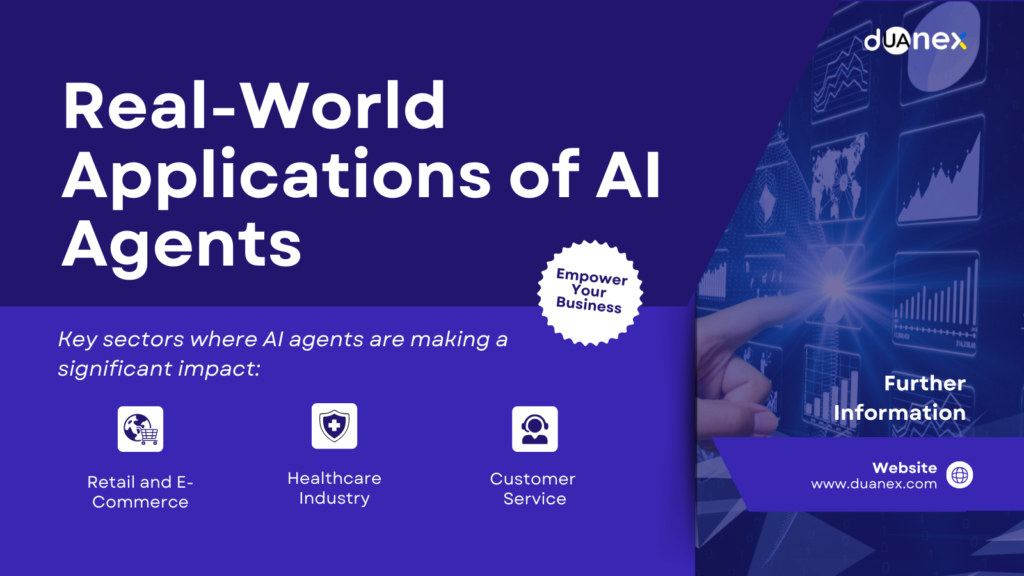
Real-World Applications of AI Agents
AI agents are transforming industries by addressing specific challenges and unlocking new opportunities. Below are some key sectors where AI agents are making a significant impact:
1. Retail and E-Commerce
In retail, AI agents enhance customer experiences, optimize operations, and drive sales. They power recommendation engines, manage inventory, and provide personalized customer support.
- Use Case: An AI agent analyzes customer browsing history to suggest products, increasing conversion rates.
- Example: Amazon’s recommendation system, which drives 35% of its revenue, is powered by AI agents.
2. Healthcare
AI agents in healthcare improve patient outcomes, streamline administrative tasks, and support medical research. They assist with diagnostics, patient monitoring, and appointment scheduling.
- Use Case: An AI agent analyzes medical imaging to detect early signs of diseases like cancer.
- Example: IBM Watson Health uses AI agents to support oncologists in treatment planning.
3. Finance
In the financial sector, AI agents enhance fraud detection, automate trading, and provide personalized financial advice. They analyze transactions in real-time to identify suspicious activity.
- Use Case: An AI agent monitors credit card transactions to flag potential fraud instantly.
- Example: JPMorgan Chase’s COiN platform uses AI agents to review legal documents, saving thousands of hours annually.
4. Manufacturing
AI agents optimize production processes, predict equipment failures, and improve supply chain efficiency in manufacturing. They enable predictive maintenance and quality control.
- Use Case: An AI agent monitors machinery to predict maintenance needs, reducing downtime.
- Example: General Electric uses AI agents to optimize wind turbine performance.
5. Customer Service
AI agents revolutionize customer service by providing instant, personalized support. They handle inquiries, resolve issues, and escalate complex cases to human agents.
- Use Case: A chatbot answers FAQs and processes refunds, reducing wait times.
- Example: Zendesk’s Answer Bot resolves 20% of customer inquiries without human intervention.
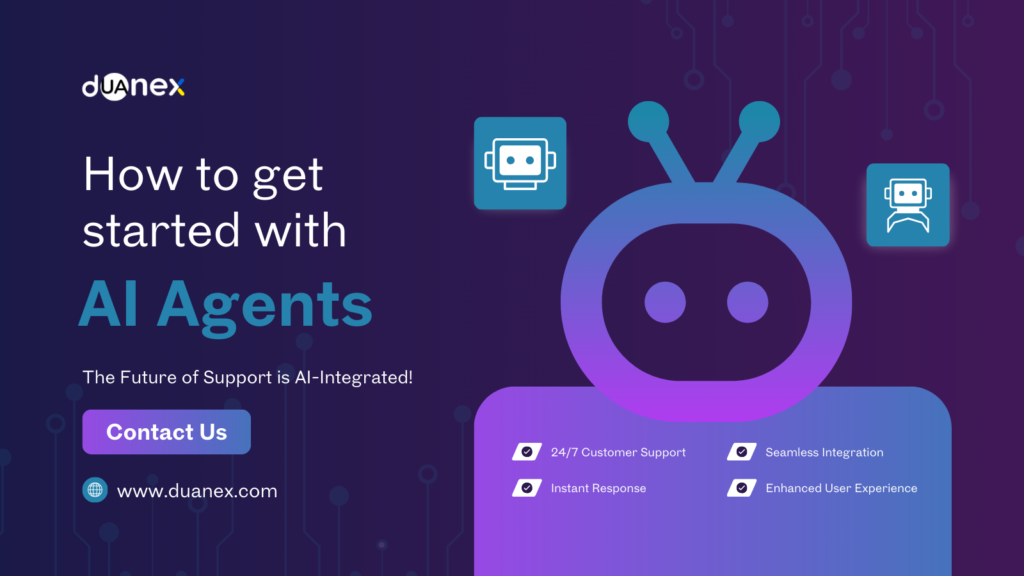
How to Get Started with AI Agents
Ready to harness the power of AI agents for your business? Follow these steps to get started:
1. Identify Business Needs
Assess your business processes to identify areas where AI agents can add value, such as customer service, operations, or analytics.
2. Choose the Right AI Agent
Select an AI agent type (e.g., chatbot, recommendation engine) that aligns with your goals. Consider whether you need a reactive, deliberative, or learning agent.
3. Partner with Experts
Work with AI vendors or consultancies to design, develop, and deploy your AI agent.
4. Pilot and Test
Start with a pilot project to test the AI agent’s performance. Gather feedback and refine the system before scaling.
5. Monitor and Optimize
Continuously monitor the AI agent’s performance, using analytics to track KPIs like efficiency, customer satisfaction, and ROI. Update the system as needed to maintain effectiveness.
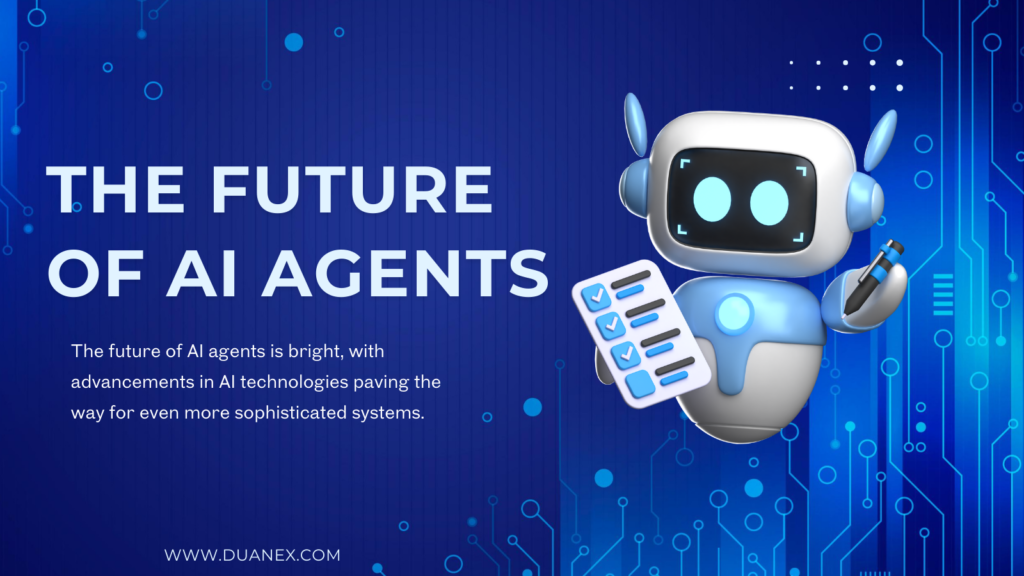
The Future of AI Agents
The future of AI agents is bright, with advancements in AI technologies paving the way for even more sophisticated systems. Here are some trends to watch:1. Increased Autonomy
Future AI agents will operate with greater independence, handling complex tasks without human intervention. For example, fully autonomous supply chain agents could manage end-to-end logistics.2. Multimodal Capabilities
AI agents will combine text, voice, and visual inputs to provide richer interactions. Multimodal agents could power immersive customer experiences, such as virtual shopping assistants.3. Collaborative Ecosystems
Multi-agent systems will become more prevalent, with AI agents working together across industries. For instance, healthcare agents could collaborate with insurance agents to streamline claims processing.4. Ethical AI Standards
As AI adoption grows, businesses will prioritize ethical AI practices, ensuring transparency, fairness, and accountability in agent behavior.5. Democratization of AI
Cloud-based AI platforms and low-code tools will make AI agents accessible to businesses of all sizes, leveling the playing field for small and medium enterprises.Word from Duanex
AI agents are transforming the way businesses operate, offering unprecedented opportunities to enhance efficiency, improve customer experiences, and gain a competitive edge. From automating routine tasks to delivering personalized insights, AI agents are a game-changer for industries ranging from retail to healthcare. While challenges like cost and data privacy must be addressed, the benefits of AI agents far outweigh the hurdles.
By embracing AI agents, your business can unlock new levels of innovation and growth. Whether you’re a small startup or a global enterprise, now is the time to explore how AI agents can drive your success in the digital age. Start small, partner with experts, and watch your business thrive with the power of AI.
